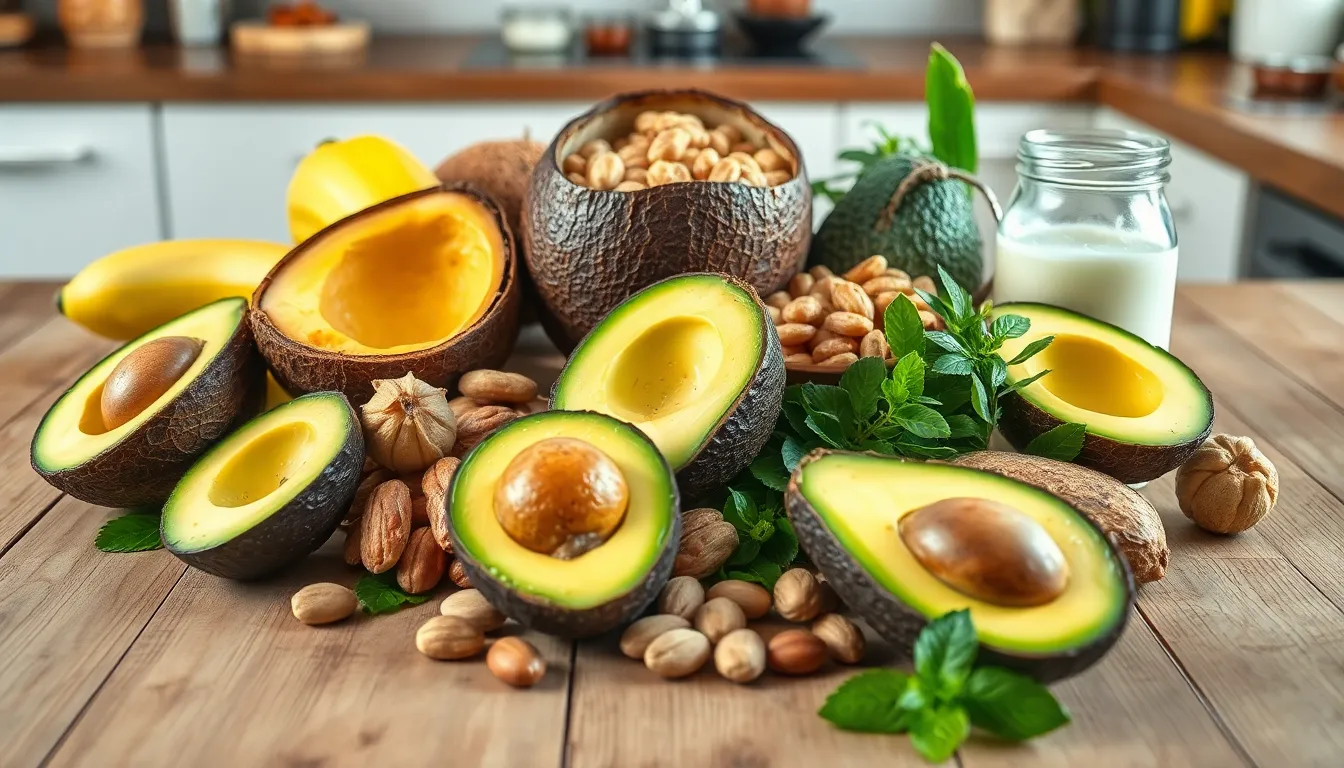Medium-chain triglycerides, or MCTs, have gained popularity in the health and wellness community for their potential benefits. Found in certain foods, these fats are quickly absorbed by the body and converted into energy, making them a favorite among athletes and those following low-carb diets. Understanding where to find MCTs can help anyone looking to boost their energy levels and enhance their overall health.
From coconut oil to dairy products, various foods are rich in MCTs. Incorporating these into daily meals can provide not just flavor, but also a convenient source of fuel. Exploring the different options available can empower individuals to make informed dietary choices that align with their health goals.
Table of Contents
ToggleOverview of MCTs
Medium-chain triglycerides (MCTs) consist of fatty acids containing 6-12 carbon atoms. These unique fats offer rapid absorption, providing an immediate source of energy. Unlike long-chain triglycerides found in many food sources, MCTs bypass the usual digestion process and are quickly utilized by the body. This efficiency makes them a preferred choice among athletes and individuals following ketogenic or low-carb diets.
MCTs include caproic acid (C6), caprylic acid (C8), capric acid (C10), and lauric acid (C12). Each type varies in its properties and benefits. For instance, caprylic acid is often associated with enhanced cognitive function, while lauric acid possesses antimicrobial properties.
Incorporating MCT-rich foods into daily meals can significantly support energy levels and mental clarity. Food sources rich in MCTs include:
- Coconut Oil: Contains about 62-65% MCTs and is versatile for cooking and baking.
- MCT Oil: A concentrated form of MCTs, often derived from coconut or palm oil, used as a supplement for quick energy.
- Dairy Products: Full-fat dairy, such as cheese and whole milk, contains small amounts of MCTs along with other nutrients.
- Palm Kernel Oil: Contains a notable amount of MCTs and can be used similarly to coconut oil.
Overall, MCTs play a significant role in nutrition by providing a unique energy source that supports various lifestyles and health goals.
Benefits of Foods with MCT in Them

Foods containing medium-chain triglycerides (MCTs) offer several health benefits, particularly in energy, weight management, and cognitive function.
Energy Boost
MCTs provide a rapid energy source due to their quick absorption into the bloodstream. They undergo minimal digestion, allowing for immediate utilization by the body. Athletes often consume MCTs before workouts to enhance performance and endurance. For example, a study published in the American Journal of Clinical Nutrition suggests that MCTs can improve exercise performance in trained individuals.
Weight Management
Incorporating MCTs into the diet may aid in weight management. Research indicates that MCTs can increase feelings of fullness and promote fat loss. One study in the Journal of Nutrition found that individuals consuming MCTs experienced greater reductions in body fat compared to those consuming long-chain triglycerides. Working with calorie-restricted diets, MCTs can serve as a beneficial supplement to enhance weight loss efforts.
Cognitive Function
MCTs may support cognitive function by serving as a quick energy source for the brain. Studies suggest that ketones, produced from MCTs, can improve mental clarity and focus. Alzheimer’s patients, for example, have shown improvements in cognitive performance with MCT supplementation, as highlighted in research published in Neurobiology of Aging.
Types of Foods Containing MCTs
MCTs appear in a variety of foods, each delivering unique nutritional profiles and benefits. Incorporating these foods can optimize energy levels and support health aims.
Coconut Oil
Coconut oil consists of about 62% to 65% MCTs, making it a primary source. It contains lauric acid, which converts to monolaurin, known for its antimicrobial properties. Commonly used in cooking and baking, coconut oil enhances flavor while boosting energy.
Palm Kernel Oil
Palm kernel oil contains approximately 47% MCTs, predominantly lauric acid and capric acid. This oil provides similar benefits to coconut oil. It is often used in processed foods and as a cooking fat, contributing to improved energy and metabolism.
Dairy Products
Dairy products, particularly full-fat varieties, contain various types of MCTs. Cream and cheese are notable sources. These foods bring benefits like enhanced satiety and energy provision, supporting weight management and better cognitive function.
MCT Oil
MCT oil is a concentrated source of medium-chain triglycerides, typically derived from coconut or palm kernel oil. It consists mainly of caprylic and capric acids, providing rapid energy and cognitive support. Used in smoothies, coffee, or as a salad dressing, MCT oil offers a convenient way to boost MCT intake.
How to Incorporate MCT-rich Foods into Your Diet
Incorporating MCT-rich foods into daily meals enhances energy and supports overall health. These foods can easily fit into meals throughout the day.
Breakfast Ideas
- Smoothies: Blend coconut oil or MCT oil into smoothies for an energizing start. Mix with fruits like bananas or berries, along with spinach or kale for added nutrients.
- Oatmeal: Stir in a tablespoon of MCT oil into oatmeal for healthy fat content. Top with nuts and seeds for added texture and protein.
- Egg Dishes: Cook eggs in coconut oil, adding vegetables for a nutrient-dense breakfast. This combination delivers a satisfying meal with high energy.
- Coffee: Mix MCT oil into coffee to create a creamy, energizing beverage. This combination, often known as “bulletproof coffee,” boosts energy levels and cognitive function.
Cooking and Baking Tips
- Substituting Oils: Use coconut oil or MCT oil instead of other oils in sautéing or frying. This swap adds MCTs while retaining flavor in dishes.
- Baked Goods: Incorporate MCT oil in baking recipes, replacing some butter or traditional oils. This adds health benefits without changing taste.
- Salad Dressings: Blend MCT oil into homemade salad dressings. Combine it with vinegar, herbs, and spices for a nutritious and flavorful addition.
- Soups and Stews: Add MCT oil to soups or stews during cooking for an extra burst of energy. This method enriches the meal while maintaining its original flavors.
Potential Risks and Considerations
MCTs present potential risks and considerations that warrant attention. Individuals sensitive to fats may experience digestive issues, such as diarrhea or stomach cramps, when consuming high amounts of MCTs. It’s advisable for those prone to gastrointestinal discomfort to start with small servings and gradually increase intake.
Consuming excessive MCTs can also affect lipid profiles. Elevated levels of LDL cholesterol might occur in some individuals, which has implications for heart health. Monitoring cholesterol levels through routine screenings is important for those incorporating significant MCTs into their diet.
Allergies and intolerances to specific sources of MCTs, such as coconut or palm oil, may pose risks for some consumers. People with known allergies should avoid these food sources to prevent adverse reactions.
In diabetic individuals, MCTs may alter blood sugar levels. While MCTs can stabilize glucose levels, it’s crucial for diabetic patients to consult healthcare professionals before dramatically changing their dietary fat intake.
Interactions with medications aren’t uncommon. MCTs may enhance the absorption of fat-soluble drugs, potentially leading to elevated effects. Engaging with a healthcare provider before starting MCT supplements or making significant dietary changes remains essential.
Overall, awareness of these potential risks ensures safer consumption of MCT-rich foods while maximizing their benefits.
Incorporating MCT-rich foods into daily meals can significantly enhance energy levels and support overall health. With options like coconut oil and dairy products readily available, it’s easier than ever to enjoy the benefits of medium-chain triglycerides. These foods not only provide quick energy but also aid in weight management and cognitive function.
While MCTs offer numerous advantages, it’s essential to be mindful of potential risks associated with their consumption. By understanding individual sensitivities and consulting healthcare professionals when necessary, one can safely enjoy the benefits of MCTs. Embracing these foods can lead to a healthier lifestyle and improved well-being.


